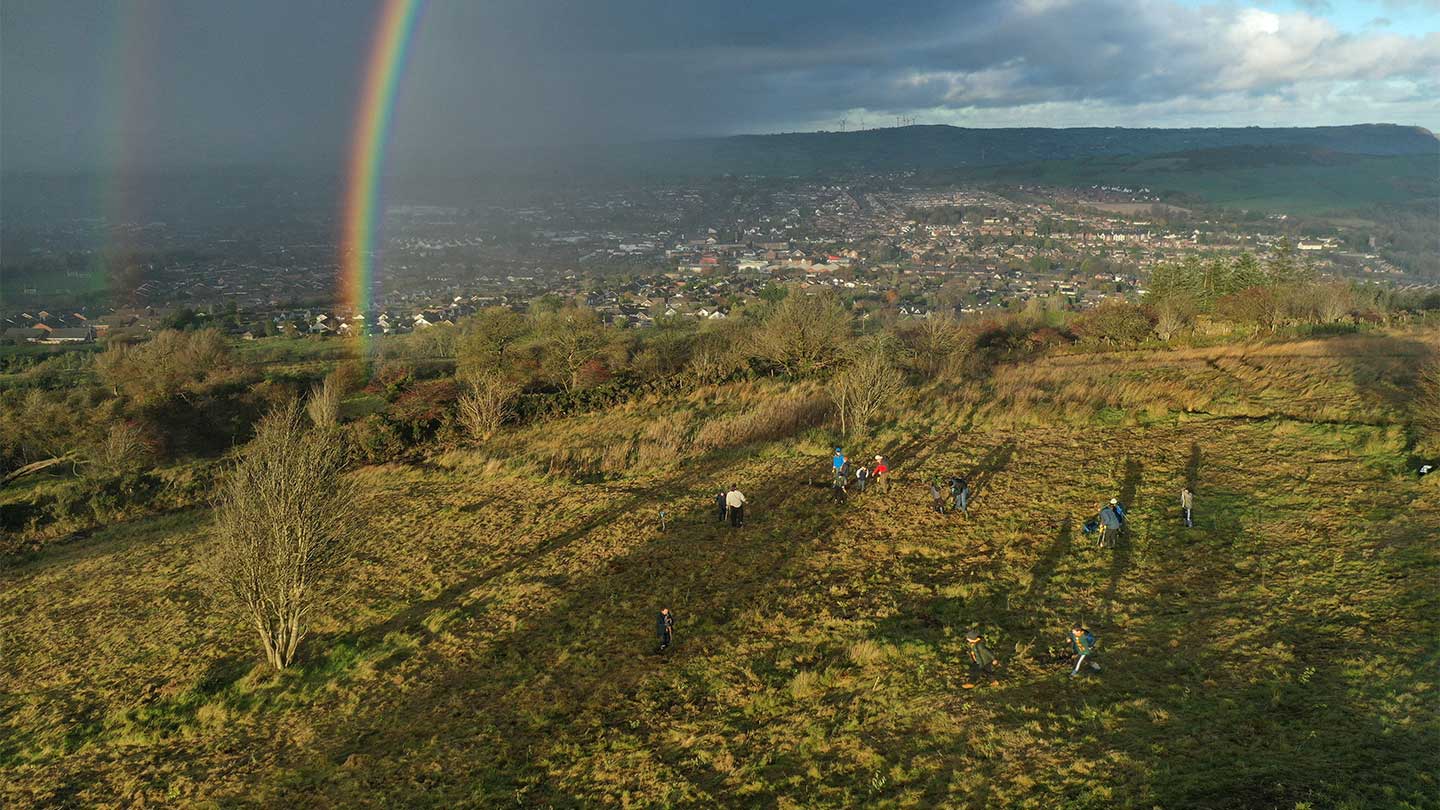DÚLRA thinks of the new Glas-na-Bradan wood as his own. Because among the 150,000 trees planted there, one of them is his – a Black Mountain holly sapling transported all the way over to the other side of the Belfast Hills where it has found the perfect home.
Asking the public to help plant trees to create the new forest was a Woodland Trust masterstroke – it gave thousands of people ownership of it. And Dúlra knows that long after he’s gone, the holly will be growing strong, elbowing away its less hardy rivals to reach for the sky and give thorny protection to generations of birds. Maybe some day he’ll go looking for it, but this week he didn’t bother. It’s enough to know it’s there. And it's in good company, all the other wee trees are also native Irish species, and all have come from seeds gathered on this island. Still, Dúlra knows his is the only Black Mountain holly. And that makes it extra special.
A STAKE IN THE FUTURE: Mac the terrier and Dúlra’s Black Mountain holly sapling
A tree’s provenance is key as it’s now known each species develops unique characteristics over millennia that make it best suited to an area’s microclimate. They can even change from townland to townland. The thousands of saplings planted all around Dúlra’s holly had been sourced from seeds in Cork, so the Belfast holly has a head start in the evolutionary race.
The 150,000 saplings across much of the wood’s 260 acres are still minuscule, but this week Dúlra got a clear sign that the rewilding of the hillside is already a success. And that sign was being carried in the wind.
The ‘reeling’ call of the grasshopper warbler is like no other bird. You couldn’t call it a song, it’s more like the continuous clicking of a fishing reel. You’d hear it normally at dawn and dusk as the secretive bird comes out of hiding to stake its claim to its territory. That this one on Glas-na-Bradan was calling so loudly at midday is a sure sign that it's totally at ease in its new home.
Dúlra heard it loud and clear, but maybe not for much longer. Even though the mechanical song can carry for a kilometre, it’s of such a high pitch that it often doesn’t register for older people. It’s why old birdwatchers often talk about how the grasshopper warbler of their youth has totally disappeared!
This bird needs dense, low vegetation, where it feeds on insects. Now that the cattle have been removed from Glas-na-Bradan, the meadowsweet-packed grasses are waist-high. The bird's Irish name – ceolaire casarnaí, warbler of the undergrowth – references its favourite habitat. If it wasn’t for that unique call, you’d never know it existed. It rarely shows itself after it arrives from Africa in the spring. Unlike the other warblers, it walks rather than hops and so it carefully and silently picks its way through the bottom of the undergrowth step by step, always keeping ahead of any predators or visitors.
As for trying to locate its nest, well... Dúlra has tried and tried and failed and failed. But he’s in good company as it has even evaded all our top local twitchers. Among birdwatchers, its nest is the holy grail, the one that will earn you honour and respect beyond your dreams. It was a goal that Dúlra chased for many years, sitting motionless for hours on end on damp hillsides at Slievenacloy, getting cramp while watching thickets through binoculars for the slightest movement – but it was all to no avail. The grasshopper warbler was way too smart. Today, it’s enough for Dúlra to know it’s there. When you consider there are just 5,000 pairs breeding in Ireland, each one is precious.
This once-forgotten hillside above St Enda’s GAA ground is now a beacon for walkers and families, with wide paths created all around the planned new forest.
It offers great views of Belfast and beyond, and also a bird’s call that will stop you in your tracks.
It’s worth heading to Glas-na-Bradan just to hear it – while you’re still young enough!
•If you’ve seen or photographed anything interesting, or have any nature questions, you can text Dúlra on 07801 414804.








